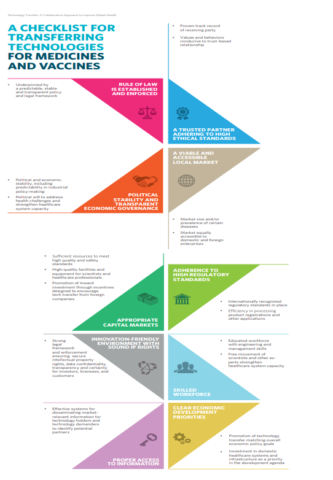
Boosting
Innovation and Access
Technology Transfer
Technology Transfer
The transfer of advanced technology is essential for economic development. It enables countries to accelerate the acquisition of knowledge, experience, and equipment related to advanced, innovative industrial products and processes.
Technology transfers for medicines and vaccines can bring additional, unique benefits. These transfers not only drive economic and social development, but can also help improve the health of recipient countries’ populations by increasing access to innovative medicines and vaccines.
Our publication, Technology Transfer: A Collaborative Approach to Improve Global Health, summarizes the current landscape for technology transfers, the 10 factors that enable success, and how different stakeholders can work together to deliver on prerequisites.
The landscape for pharmaceutical technology transfers has evolved signifcantly in recent years. As pharmaceutical technology and production have become more complex, technology transfers have come to require a greater level of expertise, human skills, organizational and procedural knowledge, and other key tangible and intangible elements. At the same time, emerging economies and middle-income countries have developed sophisticated pharmaceutical industries, enabling more dynamic flows between countries.
The COVID-19 pandemic has also introduced new considerations, challenges, and misperceptions. Overall, the pharmaceutical industry has tapped its long track record of technology transfers to enable the rapid scaling of COVID-19 vaccine production. In just the first year of COVID-19 vaccines, there have already been more than 300 manufacturing and production deals around the globe, the vast majority of which (approx. 75%) involve some sort of licensing and transfer of technology, and at least 30 of them on mRNA vaccines.
However, there have been growing calls for even greater levels of COVID-19 technology transfer, particularly for low-income countries. While addressing COVID-19 in these countries is critically important, there is not yet broad recognition of the many complex factors that must be addressed to ensure the safe, high-quality production of these vaccines, including those related to site selection and capabilities, national regulations and licensure requirements, and workforce skills. These factors must be considered and addressed in all countries where technology transfers occur, especially for complex innovations like mRNA vaccines:
- Rule of law is established and enforced
- Political stability and transparent economic governance
- A trust partner adhering to high ethical standards
- A viable and accessible local market
- Appropriate capital markets
- Innovation-friendly environment with sound intellectual property rights
- Proper access to information
- Aherence to high regulatory standards
- Skilled workforce
- Clear economic development priorities.
Technology transfers should be seen as just one tool in a larger toolbox for increasing the global availability of medicines and vaccines, rather than as a panacea. This recognition can help to ground technology transfers in reasonable goals and expectations, as well as place the needed focus on other responses and health policy measures.
Over 300
Global manufacturing and production deals for COVID-19 in one year
75%
Involving shared licensing or tech transfer
At least 30
Tech transfers for mRNA vaccines











